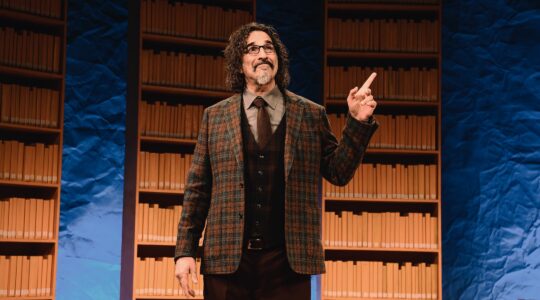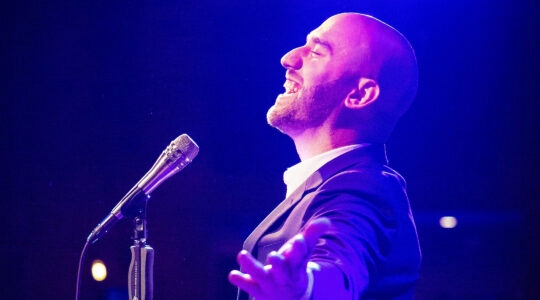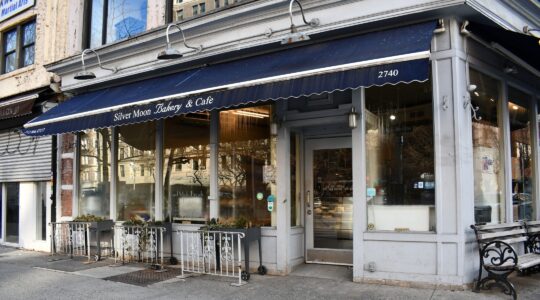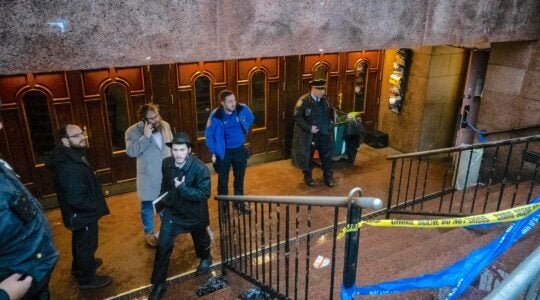The author, second from the left, with her Millburn USY board members. Sophie is communications vice president.
From second grade on I went to Hebrew school once a week and later twice a week. We learned to make the Hebrew alphabet out of Twizzlers. As I got older, I learned to read Hebrew. We learned about Moses and the Israelites, Noah and his ark, Jacob and his brides, and other stories from the Bible. Surrounded by people who shared the same beliefs, I was told to agree with them.
I attended Hebrew school every week, though grudgingly. I worked hard with my teachers and my tutors to prepare for my bat mitzvah. Months later I stood in front of family and friends to read from the Torah, and after my bat mitzvah I wanted nothing more than to never set foot in a temple again. Though I mastered my Torah portion, the endless memorization and lessons made Hebrew school my main Jewish experience, feel like a chore.
Of course, I went to temple for the High Holy Days, bar and bat mitzvahs and other required events. But that was the extent of my Jewish activity. It wasn’t until my freshman year of high school when that began to change, and I realized that Judaism is about much more than prayer.
A group of my friends was very active in a local chapter of United Synagogue Youth (USY). After being badgered for weeks, I agreed to attend an event. As much as I was expecting to hate the program, I ended up really enjoying the activity and the opportunity to hang out with my friends. I became involved with USY and started going to more and more chapter events. We did all sorts of unique activities; one of my favorites is still candy sukkah-building competitions.
I went to my first regional convention, which took place less than an hour from my home. Unsure of what to expect, I waited while everyone dramatically reunited with friends from other chapters. The speed and ease with which these people, who were friends for many years, accepted me and the other new people was amazing. Watching all of these groups of teenagers stand together and pray was eye-opening. Different groups of friends would intermingle and strangers would whisper to each other during services as everyone prayed quietly or screamed with ruach (energy).
Perhaps the most amazing things to me were the group discussions. People could choose which groups they wanted to go to and sit with their peers and a moderator to discuss real issues. Some of the discussions related directly to the Torah, but most were linked to human interactions and human rights, all in a Jewish context. During my first seminar I recognized the amazing mix of people involved in USY.
Of course, as a Conservative youth group its members were mostly Conservative Jews. But levels of religion varied with each individual. Some people ate kosher at all times, others only in the house. Some people, like myself, occasionally had Shabbat dinners and others were incredibly observant, going to temple every week. Somehow as a religious organization, USY seemed a haven and uniting factor for a diverse group of teens with all sorts of different lives, viewpoints and experiences.
A year after becoming active in USY, I decided to get involved in The Friendship Circle. I’ve always enjoyed volunteering, and working with kids and the Friendship Circle gave me the opportunity to volunteer with inspiring, special needs children. I also got to interact with an even more varied group of Jewish individuals.
Friendship Circle is organized and led by members of Chabad, an Orthodox outreach movement. The people who run the events are much more devout than people I would usually meet. The teen volunteers represent many different types of Jews — some are extremely religious, some attend Jewish schools, some are moderately religious and some are extremely Reform.
All of these people from different religious backgrounds are united by two concepts. First, of course, we all have the desire to make a difference in the lives of special needs children. However, every person in the room was also influenced in some part by Judaism. The Jewish idea of tikkun olam, improving the world, is incredibly relevant to me.
Over the past three years I’ve been actively involved in USY and Friendship Circle; they are my main extra-curricular activities. I began participating in both events because of their strong Jewish communal foundation. Although they are made up of likeminded, Jewish teens, they exposed me to diversity in my religion that I had not experienced in Hebrew school. The focus on creating a Jewish environment and community was completely unexpected.
Instead of seeing Judaism only as a measure of prayer and temple attendance, I began to see it in connection to tikkun olam and a feeling of connection to the world around me. Judaism is no longer about memorizing prayers. Instead I prefer to focus on my meaningful interactions with the Jewish communities I have joined.
The New York Jewish Week brings you the stories behind the headlines, keeping you connected to Jewish life in New York. Help sustain the reporting you trust by donating today.




